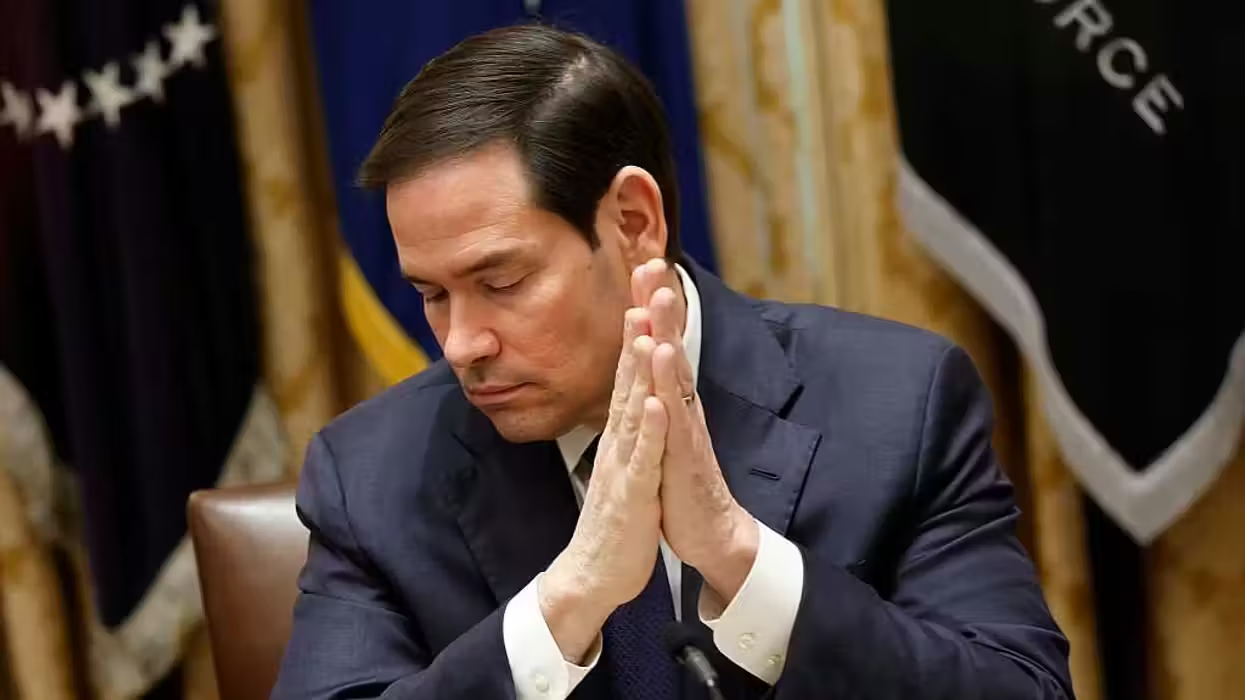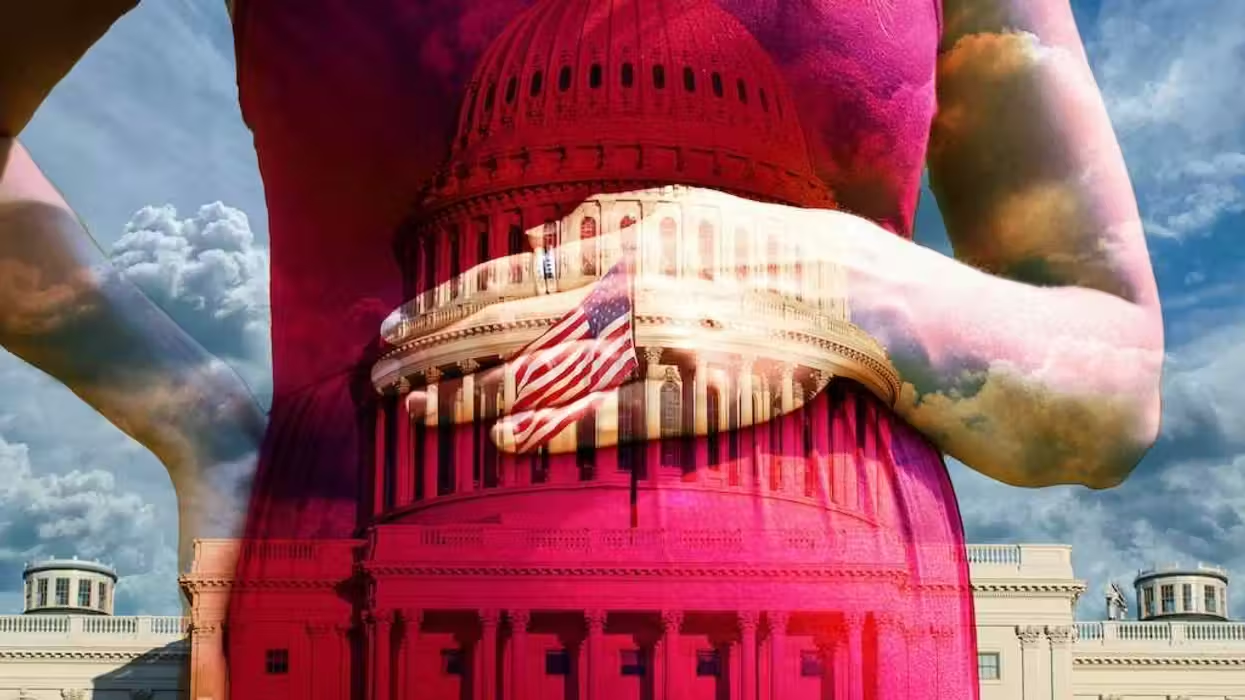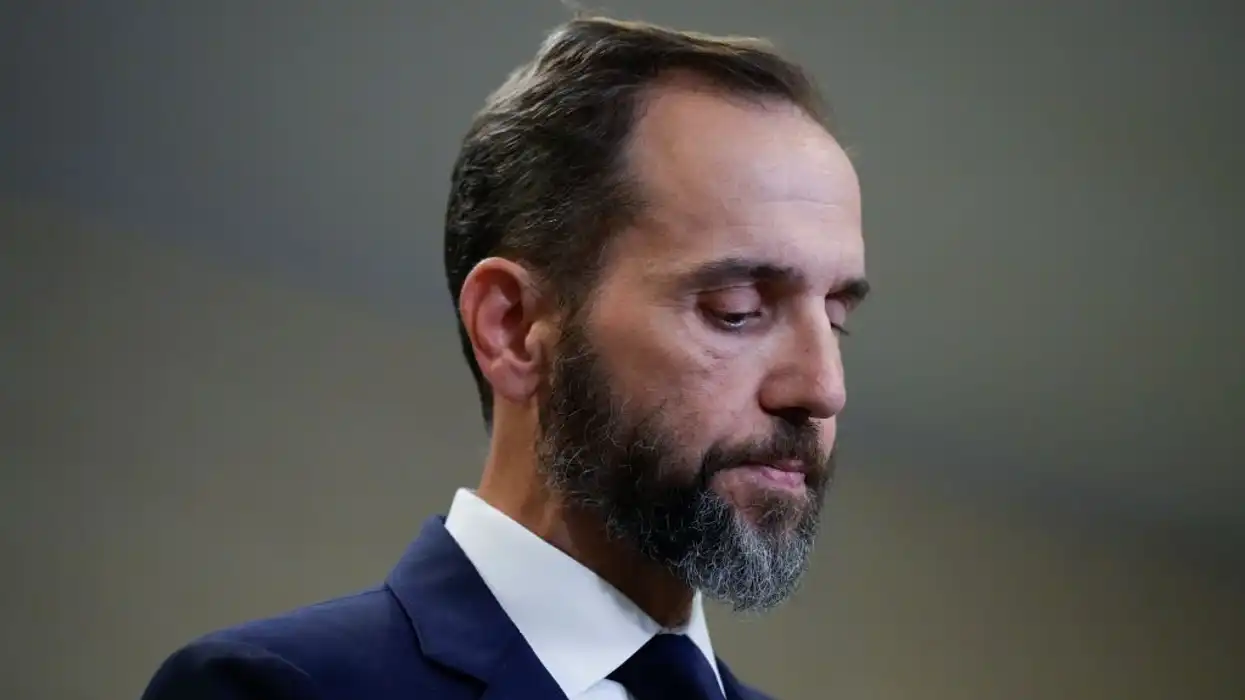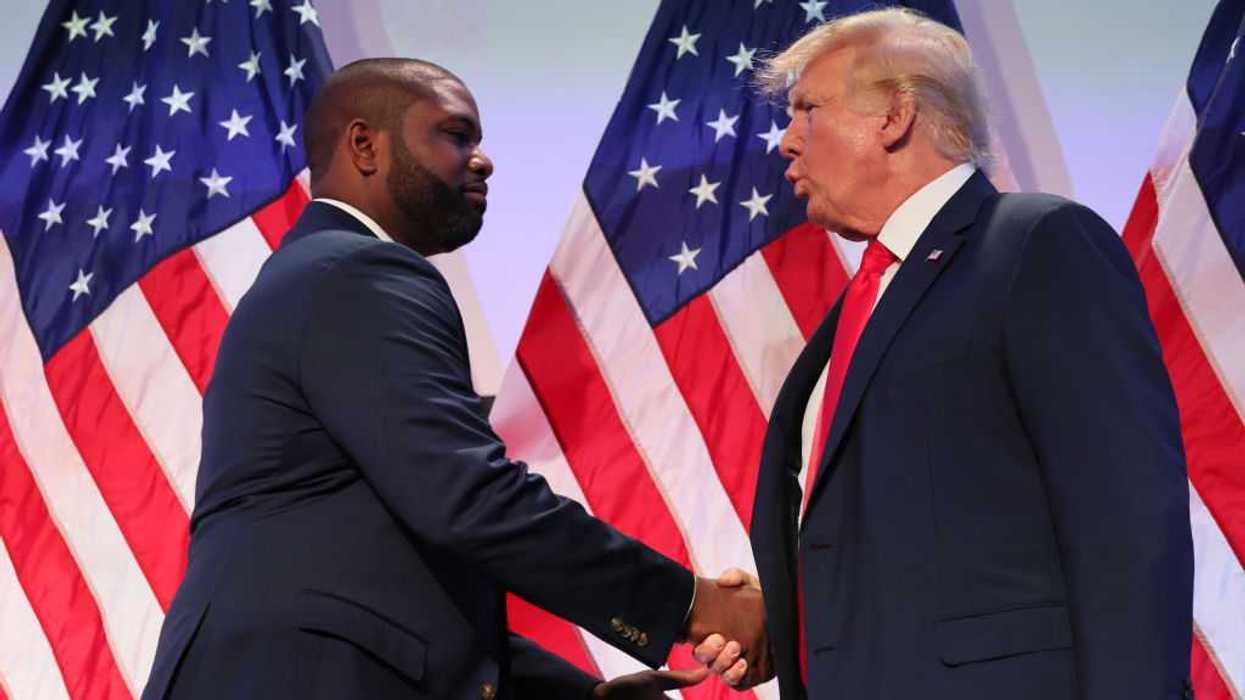
© 2026 Blaze Media LLC. All rights reserved.
 As TheBlaze continues its series examining President Obama's mentors and potential influences, one man stands out above the rest as the president's earliest mentors: Frank Marshall Davis.
As TheBlaze continues its series examining President Obama's mentors and potential influences, one man stands out above the rest as the president's earliest mentors: Frank Marshall Davis.
You might recall details about Frank Marshall Davis from TheBlaze's extensive review of "The Communist," a scholarly book authored by Dr. Paul Kengor chronicling the controversial figure's path from oppressed black, to Republican advocate, to a fully-fledged card-carrying member of the Communist Party USA.
A young Frank Marshall Davis (Photo source: LetsRollForum)
In fact, imagine an American man so staunch in his Marxist ideals, that during the Cold War he made the FBI's security index as a high risk person. This meant that if an armed conflict were to have escalated between the U.S. and the former Soviet Union, Davis could have been apprehended on charges of potential treason. Now, imagine that that man is not the character of a James Bond movie, nor simply a relic of the 1960s radical past, but rather the primary role model, father figure even, of the adolescent who would one day go on to become the leader of the free world.
(Related: Guilty as Sin, Free as a Bird: Meet Obama Mentor #2, Bill Ayers)
Kengor, along with other experts have agreed for some time that Davis was one of the president's earliest mentors and that the "Frank" mentioned no less than 22 times in the print-version of Obama's 1995 memoir, "Dreams From My Father" was none other than the infamous Communist agitator. To illustrate just how influential the Marxist-radical was to Obama, it should be noted that "Frank" appears in all three sections of "Dreams," and at each milestone and pivotal moment of Obama's life as detailed in the book.
Curiously, despite being such a key influence in a young Obama's life, author Jack Cashill, along  with Kengor, noted that “Frank” had actually "disappeared" from the 2005 audio version of "Dreams," which was narrated by Obama himself. After re-listened to the entire audio book in September 2012 and comparing it to the unabridged print-edition, Kengor confirmed that the audio version had indeed been scrubbed of all references to Davis.
with Kengor, noted that “Frank” had actually "disappeared" from the 2005 audio version of "Dreams," which was narrated by Obama himself. After re-listened to the entire audio book in September 2012 and comparing it to the unabridged print-edition, Kengor confirmed that the audio version had indeed been scrubbed of all references to Davis.
“Every reference to ‘Frank’ everywhere in the book, from every section—and there are many of them—are gone,” Kengor told TheBlaze in an email.
The omissions are of particular import when one considers that 2005 was the year following Obama's now-famed speech at the Democratic National Convention which propelled him to stardom. It is perhaps safe to surmise that since he was a relative unknown in 1995, when "Dreams" was first published, few would have taken notice of the book's references to a 1960s Marxist-radical mentor. After 2004, however, when it was clear Obama would become a fixture on the national political scene, greater scrutiny of the aspiring politico may have prompted him to take action and conceal the more questionable aspects of his past.
As noted in TheBlaze's earlier article on the suspicious purging of the book's key text, the Random House website reveals that all audio versions of “Dreams,” along with Obama’s subsequent book, “The Audacity of Hope,” are only available in the abridged format. But if Davis was important enough to erase from the pages of Obama's history, who, exactly was he?
Will the real "Frank" please stand up?
 Frank Marshall Davis was born in Arkansas City, Kansas in 1905 and was raised by his mother, stepfather and grandparents. Given the times, he endured his share of racism, harassment and even came close to losing his life at the hands of bigots who assailed him relentlessly during his school days. Still, Davis, as even described by Kengor, was a sympathetic character who managed to pull himself up by the bootstraps and attend college in his home state where he studied journalism. While Davis did not graduate, he would go on to work as editor-in-chief for various newspapers around the country, all be they Communist ones.
Frank Marshall Davis was born in Arkansas City, Kansas in 1905 and was raised by his mother, stepfather and grandparents. Given the times, he endured his share of racism, harassment and even came close to losing his life at the hands of bigots who assailed him relentlessly during his school days. Still, Davis, as even described by Kengor, was a sympathetic character who managed to pull himself up by the bootstraps and attend college in his home state where he studied journalism. While Davis did not graduate, he would go on to work as editor-in-chief for various newspapers around the country, all be they Communist ones.
Ironically, Davis wasn't always a hardline Marxist whose loyalties lied with the Soviets alone. Rather, he began life as an ardent Republican, often stumping for GOP political candidates. He reviled Democrats, in particular Franklin Delano Roosevelt and his vice president, Harry Truman, likely due to their own racist-bent and ties with the Ku Klux Klan.
It bears remembering that Republicans were historically the "anti-slavery party," whose members authored all pertinent Civil Rights legislation of the 20th century. Conversely, Democrats were the party of Southern, white racists, who brought de jure racism via Jim Crow laws and the KKK to bear on the American public.
Needless to say it was a long and convoluted road that ultimately led the aspiring author to "switch sides" from thoughtful conservative to rabid Communist. Actually, it was no less than a full-fledged Soviet propaganda campaign that convinced Davis absolutely that the USSR had cracked the code of bigotry and thereby purged its lands of racism full-stop. Never mind that the black population of Russia and the whole of Eastern Europe was essentially nonexistent, those facts seemed to matter none to the now-radicalized Davis.
Part of the narrative Soviet proxies operating in America during the 1930s and 1940s dispensed,  was that the type of inequity Davis experienced as a black youth in Kansas was the product of a diseased Capitalist system and that only the Soviet Union and held the key to a Utopian society where all, regardless of race, color or creed, were accepted equally. This type of indoctrination was routinely carried out in the U.S. by Soviet moles and sympathizers with a view toward winning over the disenfranchised black community.(Photo source: KerenelMag)
was that the type of inequity Davis experienced as a black youth in Kansas was the product of a diseased Capitalist system and that only the Soviet Union and held the key to a Utopian society where all, regardless of race, color or creed, were accepted equally. This type of indoctrination was routinely carried out in the U.S. by Soviet moles and sympathizers with a view toward winning over the disenfranchised black community.(Photo source: KerenelMag)
 was that the type of inequity Davis experienced as a black youth in Kansas was the product of a diseased Capitalist system and that only the Soviet Union and held the key to a Utopian society where all, regardless of race, color or creed, were accepted equally. This type of indoctrination was routinely carried out in the U.S. by Soviet moles and sympathizers with a view toward winning over the disenfranchised black community.(Photo source: KerenelMag)
was that the type of inequity Davis experienced as a black youth in Kansas was the product of a diseased Capitalist system and that only the Soviet Union and held the key to a Utopian society where all, regardless of race, color or creed, were accepted equally. This type of indoctrination was routinely carried out in the U.S. by Soviet moles and sympathizers with a view toward winning over the disenfranchised black community.(Photo source: KerenelMag)Thus, Davis became an actual card-carrying member of the Communist Party USA after being duped by a clever propaganda campaign. The Soviets achieved this seemingly impossible feat by manufacturing what were then known as Potemkin villages (or Potyomkin villages) across the USSR -- essentially stage props created to convey the image of an idyllic agrarian society flourishing under the banner of Marxist-Leninism.
Soviet Operatives would then arrange "tours" of these facade-villages for America's intelligentsia. "Educated" or not, these dupes bought what they "saw" in the Potemkin hook, line and sinker and upon return to the U.S., quickly spread word of the Soviet's benevolence among their friends, colleagues and relatives.
The Communist
During World War II, after Adolf Hitler and Joseph Stalin signed a non-aggression treaty between their two countries, dubbed the Molotv-Ribbentrop Pact, dyed in the wool Communists in America -- particularly Marxists in the Jewish and black community -- defected. But not Frank Marshall Davis, who remained faithful to Papa Stalin even as he stood alongside a madman who abhorred blacks as much as he did Jews. Perhaps this comes as no surprise, however, as Stalin himself was, by every measure, a racist in his own right and that fact seemed not to faze American black Communists in the least.
(Photo source: LatvianHistory)
What the reward was for such loyalty still remains to be seen, but Davis continued penning pro-Soviet, pro-Stalin articles for the Communist papers, the Chicago Star and Honolulu Record well into the latter half of the 20th century.
As his Communist agitation intensified, by 1956 Davis found himself being called to Washington by Senate Democrats to testify before Congress about his Communist dealings. He even garnered, according to Kengor, a 600-page FBI file, which revealed that Obama's mentor was "repeatedly retained on the federal government’s Security Index."
Much of Davis' early writings reveal themes that appear to be embraced by President Obama even today. In his pro-Soviet columns, Davis consistently castigated Democrats who opposed Stalin, notably the Truman Doctrine and the Marshall Plan, according to Kengor. He was staunch opponent of Winston Churchill, who all accounts indicate Obama, too, holds in little regard, and championed the very same policies the president has sought to push through since taking office.
Davis was an outspoken advocate for universal healthcare, which is documented in his various articles published in both the Honolulu Record (1955) and The Chicago Star newspapers. Of consequence, Senator Claude Pepper (nicknamed “Red Pepper”), also a columnist at The Star, actually wrote the legislation for socialized medicine during his time in office.
Likewise, Davis also advocated for public works projects and, unsurprisingly, frequently engaged in class warfare rhetoric in much the same way Obama invokes his "fair-share" meme. To highlight this parallel, it bears noting that Davis and his publications routinely vilified the wealthy and accused high-income earners of “not paying their fair share.” He also blasted “big oil,” and loathed beyond compare (wait for it) General Motors.
“If Frank Marshall Davis could have nationalized GM in the 1940s,” Kengor told TheBlaze in an exclusive interview, “he would have.”
“Obama was his pupil.”
While it is certainly no coincidence Leftists around the world perpetuate many of these same hackneyed clichés about the "bourgeois," calling for the nationalization of General Motors is a more specific example underscoring Davis' impact on Obama. When viewed in its proper context, the words of deeds of this devout Communist perhaps speaks to the president’s worldview at its most base level.
It is also worth mention that the Obama campaign’s slogans, “forward!” and “change,” are not a matter of happenstance. Both words, while seemingly innocuous at first blush, are in fact hard-and-fast Communist catch phrases that were used in essentially all Soviet propaganda campaigns led by Vladimir Lenin, Joseph Stalin, and later Mao Zedong. These very same terms were also invoked routinely by Frank Marshall Davis both in his pro-Soviet newspapers and when discussing the “transformative change” he believed America was in such desperate need of, according to Kengor.
Other parallels between the president and his ideologue-mentor can be found in the leveraging of “social justice pastors.” We can see the re-emergence of these pastors in faith-leaders like Jim Wallis and Rev. Jeremiah Wright, to name a few.
(Related: Meet Obama Founding Father #1, Rev. Jeremiah Wright)
Likewise, during the Soviet-era, Davis reached out frequently to Christians, schooling them on the virtues of Communism and instructing them on whose side to stand when the Cold War hammer really came down. He routinely argued that Communism was consistent with the Gospel of Jesus, despite the fact that the entire sociopolitical system hinges on a rejection of God and embrace of Atheism. What's more, Davis even likened anti-Communists to Pontius Pilate.
According to Kengor, Dawna Weatherly-Williams a Hawaii resident and close friend of Davis (so much so that she allegedly called him "Daddy.") claims to have been present when Davis first met a young Obama in 1970. She asserted that Davis “influenced Barack … about social justice, about finding out more about life, about what’s important, about how to use your heart and mind.”
Want to leave a tip?
We answer to you. Help keep our content free of advertisers and big tech censorship by leaving a tip today.
Want to join the conversation?
Already a subscriber?
more stories
Sign up for the Blaze newsletter
By signing up, you agree to our Privacy Policy and Terms of Use, and agree to receive content that may sometimes include advertisements. You may opt out at any time.
Related Content
© 2026 Blaze Media LLC. All rights reserved.
Get the stories that matter most delivered directly to your inbox.
By signing up, you agree to our Privacy Policy and Terms of Use, and agree to receive content that may sometimes include advertisements. You may opt out at any time.






